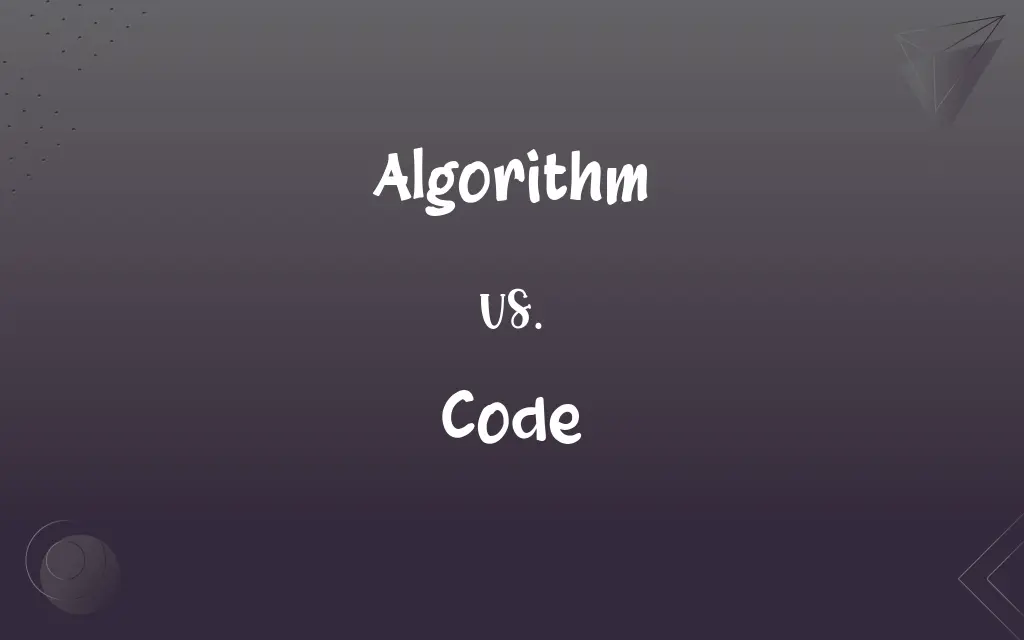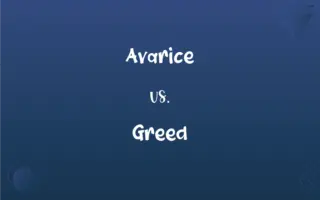Algorithm vs. Code: What's the Difference?
Edited by Aimie Carlson || By Harlon Moss || Updated on November 6, 2023
An algorithm is a step-by-step procedure for calculations. Code is the actual syntax and instructions written in a programming language implementing an algorithm.

Key Differences
An algorithm is a conceptual sequence of steps that describe how to perform a task. It’s akin to a recipe in a cookbook, detailing the process without being tied to a specific language or technology.
Code is the tangible representation of algorithms, written in a specific programming language. It is the set of instructions that a computer can execute directly, like the actual text of a recipe written in English.
Algorithms are designed to be problem-solving methods, often represented in pseudocode, flowcharts, or plain language. They are language-agnostic and focus on the logic behind solving a particular problem.
In contrast, code is the practical implementation of an algorithm into a form that can be executed by a machine. It includes syntax, programming structures, and the nuances of a programming language.
While an algorithm can be universal and applied in multiple contexts, code is specific and requires a compatible environment to run. An algorithm can exist without code, but code cannot exist without an algorithm or some form of logic it is implementing.
ADVERTISEMENT
Comparison Chart
Definition
Step-by-step procedure for solving a problem.
Instructions in a programming language.
Abstraction Level
High-level, conceptual.
Low-level, specific.
Dependence
Independent of programming languages.
Dependent on programming languages.
Representation
Pseudocode, flowcharts, natural language.
Actual source code in a programming language.
Function
Describes how to perform a task.
Executes a task on a computer.
ADVERTISEMENT
Algorithm and Code Definitions
Algorithm
Step-by-step instructions.
It outlines every step needed to complete a task. He designed an algorithm for data encryption.
Code
Executable.
Code can be run by a computer. He debugged the code for hours.
Algorithm
Problem-solving.
An algorithm provides a method to solve problems. Her algorithm quickly found the solution.
Code
Source material.
Code forms the source of computer programs. The developer optimized the code.
Algorithm
Computational.
It is used for calculations and processing. The new algorithm processed images faster.
Code
Programming instructions.
Code consists of syntax and statements. She wrote code to automate the task.
Algorithm
Sequence of actions.
It’s a specific sequence to perform tasks. The cooking algorithm yielded the perfect recipe.
Code
Computer language.
It is written in languages like Java or Python. The code compiled without errors.
Algorithm
Procedure.
An algorithm is a set of rules to be followed. The sorting algorithm improved efficiency.
Code
Coding process.
It refers to writing programming instructions. Coding all night, she finished the project.
Algorithm
A finite set of unambiguous instructions that, given some set of initial conditions, can be performed in a prescribed sequence to achieve a certain goal and that has a recognizable set of end conditions.
Code
A system of signals used to represent letters or numbers in transmitting messages.
Algorithm
(countable) A collection of ordered steps that solve a mathematical problem. A precise step-by-step plan for a computational procedure that possibly begins with an input value and yields an output value in a finite number of steps.
Code
A system of symbols, letters, or words given certain arbitrary meanings, used for transmitting messages requiring secrecy or brevity.
FAQs
Is an algorithm always written in code?
No, it can be written in pseudocode or described conceptually.
Do all programmers write algorithms?
Yes, to some degree, all programmers create algorithms.
What is an algorithm?
A set procedure to solve a problem or perform a task.
Can anyone learn to code?
Yes, with time and practice, anyone can learn coding.
What is coding used for?
To create software, websites, apps, and more.
Can code exist without an algorithm?
No, code is an implementation of an algorithm.
What does code do?
Code instructs a computer to perform tasks.
Is an algorithm just for computers?
No, algorithms can be applied to a variety of tasks, not just computing.
Are there different types of algorithms?
Yes, there are many types, including sorting and searching algorithms.
Can an algorithm be patented?
It depends on the jurisdiction and specific nature of the algorithm.
Can algorithms change?
Yes, they can be refined and improved over time.
How do I start learning to code?
Begin with online tutorials, classes, or coding bootcamps.
Why are algorithms important?
They are essential for logical problem-solving and efficient program design.
Are algorithms language-specific?
No, they are independent of programming languages.
What is source code?
The written text of a computer program.
Is coding hard to learn?
It can be challenging but is manageable with determination.
Can algorithms be inefficient?
Yes, some algorithms can be more resource-intensive than others.
How do I choose the right algorithm?
It depends on the problem’s requirements and constraints.
Are algorithms only used in math?
No, they are used in various fields, from computer science to daily life.
What makes a good piece of code?
Readability, efficiency, and maintainability.
About Author
Written by
Harlon MossHarlon is a seasoned quality moderator and accomplished content writer for Difference Wiki. An alumnus of the prestigious University of California, he earned his degree in Computer Science. Leveraging his academic background, Harlon brings a meticulous and informed perspective to his work, ensuring content accuracy and excellence.
Edited by
Aimie CarlsonAimie Carlson, holding a master's degree in English literature, is a fervent English language enthusiast. She lends her writing talents to Difference Wiki, a prominent website that specializes in comparisons, offering readers insightful analyses that both captivate and inform.































































